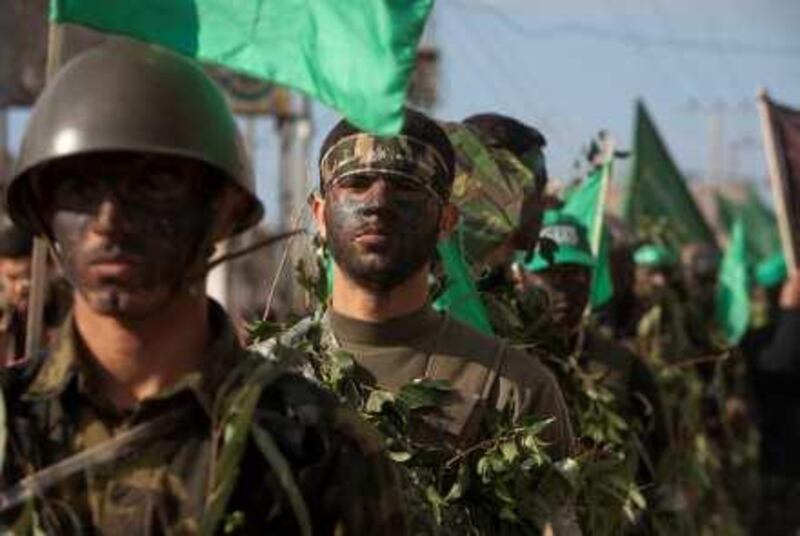JABALIYA // Walid Abu Khalid is a cautious man. He agreed to meet only at a location and time of his choosing and then only in a car that he directed to keep moving in and out of the narrow alleys of the Jabaliya refugee camp in northern Gaza to no obvious destination.
Abu Khalid, 27, a former journalism student is a field commander with the Izzedine al Qassam Brigades, the armed wing of Hamas. Although Israel's assassination policy has all but ended since last year's war, Abu Khalid, an assumed name, knows that one phone call from an informer could seal his fate. It was in large part such intelligence that Israel relied on to determine its targets during the preparation for its 22-day offensive on the Gaza Strip last year. In response, the Qassam Brigades came down hard on alleged informers, and several were reported to have been executed on sight during the Israeli offensive.
Gaza has been relatively calm since the war ended. Hamas has reined in rocket launches and Israel has kept its incursions to a minimum. But both sides have drawn their respective conclusions from that war in preparation for another battle. In the absence of any political progress, say most observers, such a battle is all but inevitable.
For Israel, the lessons have perhaps been more political than military. Yoram Schweitzer, a military analyst with the Institute for National Security Studies in Tel Aviv, said: "Israel needs to explain better to international public opinion the complexity of a war against groups such as Hamas or Hizbollah ". International opinion, he said, was not cognisant enough of the difficulty of minimising civilian casualties in a war fought in a largely urban theatre against groups employing semi-military, semi-guerrilla tactics.
Although the number of civilian deaths is a matter of some dispute (the Israeli military's figure of between 295 and 357) differs wildly from international and Palestinian counts of between 1,021 and 1,162, including nearly 250 members of the police), the high number of civilian casualties led directly to the establishment of a UN fact-finding mission into the Gaza war. Led by Richard Goldstone, a South African judge, the commission concluded that both Israel and, to a lesser extent, Hamas were guilty of war crimes for their actions during the war and Israel also of possible crimes against humanity.
Arguably, such political fallout has been manageable for Israel, which has successfully fended off attempts at legal follow-through from the Goldstone report with the help of the United States. Nevertheless, Mr Schweitzer said, the number of civilian casualties are a strategic political calculation that has to be considered before any conflict is repeated, and Israel needs to improve the accuracy of its technology to minimise such deaths, which form a method of defence for groups such as Hamas.
To Gazans, the high number of civilian casualties was evidence of the Israeli army's lack of morals. Abu Murrad, a senior Qassam commander in southern Gaza, said: "We never expected such force. All public buildings were staffed. The police stations were staffed. We expected something big, but not like that. Israel has no morals." Both Abu Murrad, also a nom de guerre, and Abu Khalid said Israeli intelligence had failed to penetrate and significantly damage the Qassam Brigades, which is in charge of military operations against Israel and Israelis. The group works in small and discreet cells and the leadership structure remains largely secret.
"From the first moment to the last, Israel hit only government structures and security forces," Abu Khalid said. "The Qassam Brigades retained their strength." Nevertheless, security procedures have been stepped up. "We rarely use mobile phones now, and we stay on the move." Brigades members will neither discuss the kinds of weapons they have nor the number of fighters, believed to be around 3,000 to 5,000. But Qassam members made no secret of their efforts to upgrade technology. Outdated equipment is often cited as one of the reasons the brigades did not inflict more casualties on the Israeli army even if Qassam fighters have always claimed they caused more damage to the Israeli army than is generally understood. Thirteen Israelis were killed during the war, 10 of them soldiers, including four in a so-called friendly fire incident.
"It was a mixture of good luck and good preparation. Sometimes soldiers stumbled across booby traps by accident, and sometimes there were mechanism failures. It was miraculous that there weren't more casualties," Mr Schweitzer said. From both Tel Aviv and Gaza the probability of renewed conflict was deemed high. "There are different ways of engaging Hamas, but this Israeli government doesn't want that," said Mr Schweitzer, who predicted that any renewed battle would be more aggressive.
Both Abu Murrad and Abu Khalid said they fully expected another round. They insisted they would be better prepared, even if they also maintained that the war had resulted in victory for Hamas. Abu Khalid rejected the suggestion that any such victory was hollow in view of the many Palestinian casualties. "Israel set many targets but achieved none. In this way, we won. I didn't say we didn't also lose."
@Email:okarmi@thenational.ae





